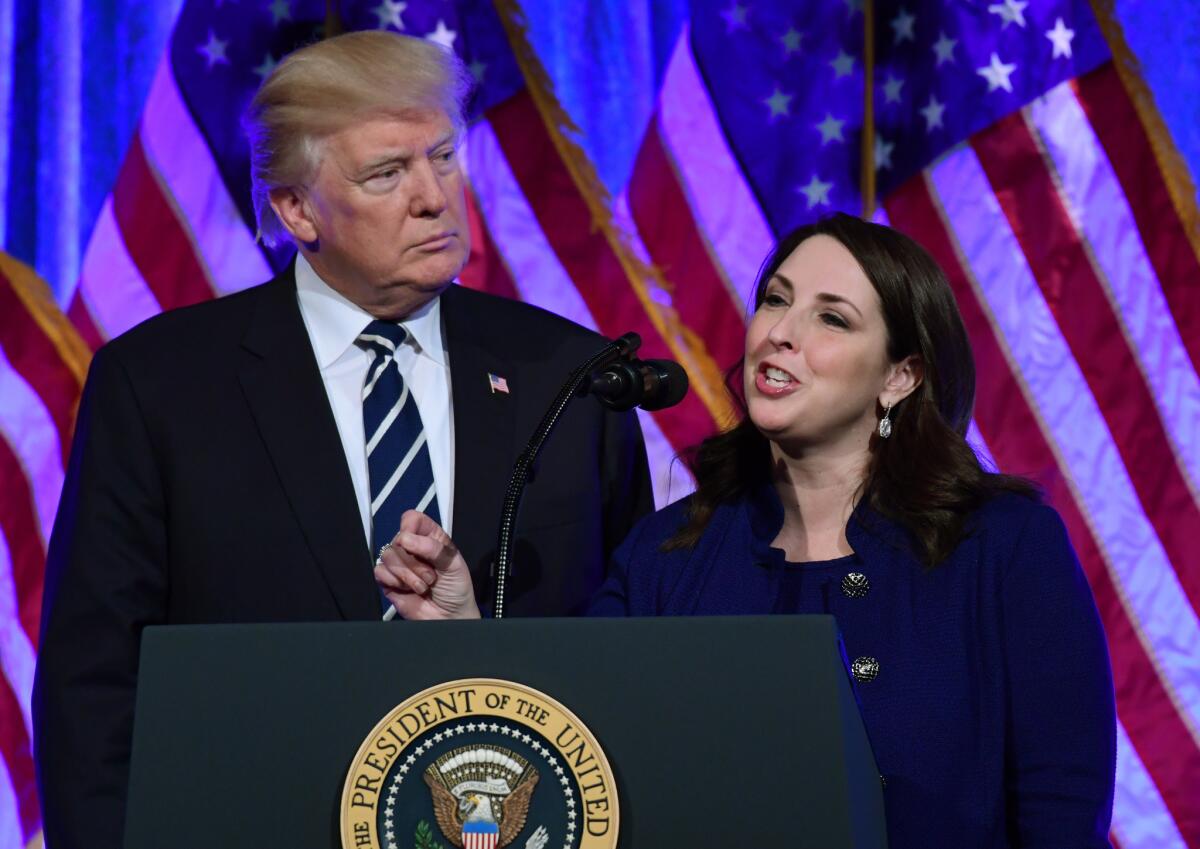Ronna McDaniel is stuck between her Romney roots and Trump’s Republican Party

Reporting from Washington — Ronna McDaniel insists she is still a Romney.
Sure, she no longer uses Ronna Romney McDaniel on Fox News and at other appearances devoted to defending President Trump. And yes, Trump urged her to drop her maiden name when he tapped her to lead the Republican Party after his 2016 election. But Trump was just joking, she says.
“It was my decision, with my husband, to emphasize the McDaniel more,” she said in an interview at Republican National Committee headquarters, where the lobby is festooned with photographs of Trump, some with McDaniel by his side. “But Romney’s still there and it’s interchangeable. I’m very proud of my Romney roots.”
As much as anyone in the Trump era, McDaniel represents Trump’s triumph over the Republican establishment, a scion of the blue-blood Romney clan serving in the insurgent House of Trump.
Romney’s uncle is Sen. Mitt Romney of Utah, the 2012 GOP presidential nominee and former Massachusetts governor. He has denounced Trump as a “con man” and a “fake,” and Trump has blasted him as a “choke artist” and “stone cold loser.”
Good luck finding a middle ground. So while McDaniel has traveled to 32 states, shattered Republican fundraising records and avoided much of the internal strife that plagued her predecessors, she has been forced to disavow her uncle’s opinions — and her maiden name — to show her loyalty to a president who demands it.
McDaniel insists that for her and her uncle, it’s nothing personal.
“Mitt and I get this, by the way,” she said. Hers is not “the only family right now that maybe has some different political opinions, that maybe is having some robust discussions,” she said.
McDaniel, 46, is still galled to be labeled “Mitt’s niece” in a recent newspaper profile of her uncle, since she chairs the Republican Party. But she says she and her uncle “get along great.”
Although Trump delights in ridiculing Romney, McDaniel said the president comforted her after she chastised her uncle’s comments about Trump as “disappointing and unproductive.”
“He’s very sensitive about the issues with my uncle, candidly,” she said. “He called me several times the day that that happened. ‘Are you doing OK? This hasn’t probably been the easiest day for you.’”
This is what it’s like to be a Romney at the top of Trump’s Republican Party, twisting between the remnants of the party establishment and the president who tore it down.
McDaniel’s Twitter feed is filled with praise for Trump’s children and in-laws. His daughter and advisor, Ivanka Trump, merited at least 70 mentions from McDaniel since she became chairwoman.
The party’s messaging is now “much more beholden to the ideology of Trump as opposed to the ideology of the GOP as a whole,” said Michael Steele, a former party chairman.
McDaniel has adopted not only Trump’s fiery language, but also, in some cases, his caustic style. On St. Patrick’s Day, the party’s official account posted a tweet that used an offensive stereotype of a drunken Irishman to mock Democratic presidential candidate Beto O’Rourke.
McDaniel grew up around her grandfather George Romney, a Michigan governor and 1968 GOP presidential candidate. She learned politics as a young girl, helping her mother, also named Ronna Romney, campaign for a family ally who lost a Republican bid for Michigan governor in 1982.
Later, while attending Brigham Young University, she became a driver for her mother’s unsuccessful 1994 U.S. Senate campaign.
Her father, Scott Romney, lost a race for state attorney general four years later but became a top advisor on his brother Mitt’s presidential campaign in 2012. (After McDaniel’s parents divorced, her mother kept the Romney name, long an asset in Michigan politics.)
McDaniel — who then went by Romney McDaniel — actively campaigned for her uncle, especially in her home state.
“She was a perfect fit from a symbolic standpoint,” said Saul Anuzis, a former Michigan state Republican Party chairman. “A young mom, conservative — fit the mold in a lot of different ways.”
After President Obama won reelection, McDaniel ran for state party positions and won. Although her family name alienated some activists, she forged alliances with the growing tea party movement.
“She just happened to be a Romney,” said Jeff Sakwa, her deputy when she became state party chair in 2015. “She literally paid her dues from a delegate all the way up.”
In 2016, when Trump’s brand of bombastic populism swept the party’s grass roots, McDaniel was forced to navigate the GOP factions: tea party, social conservative, libertarian and establishment.
“There were fires every day,” Sakwa said. “It was Sodom and Gomorrah out there.”
McDaniel stayed neutral in the Republican primary, according to party rules. But she argued to every candidate that a Republican could win Michigan in the fall despite Democrats winning the state nonstop since 1992. Trump was the most receptive to campaigning in the state during the general election, she said.
“When he would come: ‘Ronna, where are we?’ What’s going on? What’s on the ground? Where do I need to be?’ ” she recalled.
After Trump won the nomination, McDaniel did not waver. She called Trump’s taped comments about grabbing women’s genitals “disgusting” but still hit the trail for him that October weekend.
She also faced pressure from Trump’s allies to fire Wendy Day, a state party leader who had expressed public doubt about Trump’s fitness for the presidency.
McDaniel spoke to Day several times and sent flowers when Day’s father became gravely ill. But she did not hesitate to fire her, citing party bylaws that elected officers could not speak ill of the nominee.
“It was incredibly difficult,” McDaniel said. “She’s a very good friend of mine.”
When it came to Trump, “you were 100% — or nothing,” Day said in a recent interview.
That November, Trump won Michigan, a linchpin in his upset victory over Hillary Clinton.
When Reince Priebus finished his tenure as national chairman to become Trump’s first chief of staff, he recommended McDaniel as his replacement.
She impressed Trump as a forceful advocate on TV, a trait the president values as much as her considerable fundraising skill.
During the campaign, McDaniel bonded with Sarah Huckabee Sanders, now the White House spokeswoman, as they balanced raising children with demanding jobs in the male-dominated political world. They also both were fans of the TV series “Grey’s Anatomy.”
They had something else in common: a famous political family. Sanders’ father, Mike Huckabee, a former governor of Arkansas, ran twice for the Republican presidential nomination.
“Everybody assumes you think like everybody else in your family,” Sanders said.
“But you’re just kind of boxed into that,” she added. “And [McDaniel] is a very independent, strong, very capable individual in her own right, and so I think she wants to be able to be known as that.”
The 2018 midterm election not only gave Democrats control of the House. Voters swept out nearly all of Trump’s Republican critics in Congress but elected one glaring exception — McDaniel’s uncle.
Shortly before he took office in January, Romney — who tried and failed to become Trump’s secretary of State — wrote an op-ed in the Washington Post that said Trump had fallen glaringly short in shaping “the public character of the nation.”
In Trump’s world, McDaniel had little choice but to take a side.
“For an incoming Republican freshman senator to attack @realdonaldtrump as their first act feeds into what the Democrats and media want and is disappointing and unproductive,” she tweeted.
In the interview, McDaniel did not address Romney’s moral critique of Trump directly.
“I go to church for my values and my moral compass,” she said. “I don’t really look at politicians — I don’t want to say — [as] moral leaders. I don’t look to politicians that way. I look to politicians more in terms of how are they going to govern and how is that going to affect my life.”
Romney declined an interview request but said in a statement that he’s proud of McDaniel.
“She’s a dedicated and loyal chairwoman, and she has a responsibility to do what she thinks is best for our party,” he said. “At the end of the day, we both agree that family is more important than politics.”
More to Read
Get the L.A. Times Politics newsletter
Deeply reported insights into legislation, politics and policy from Sacramento, Washington and beyond. In your inbox three times per week.
You may occasionally receive promotional content from the Los Angeles Times.











